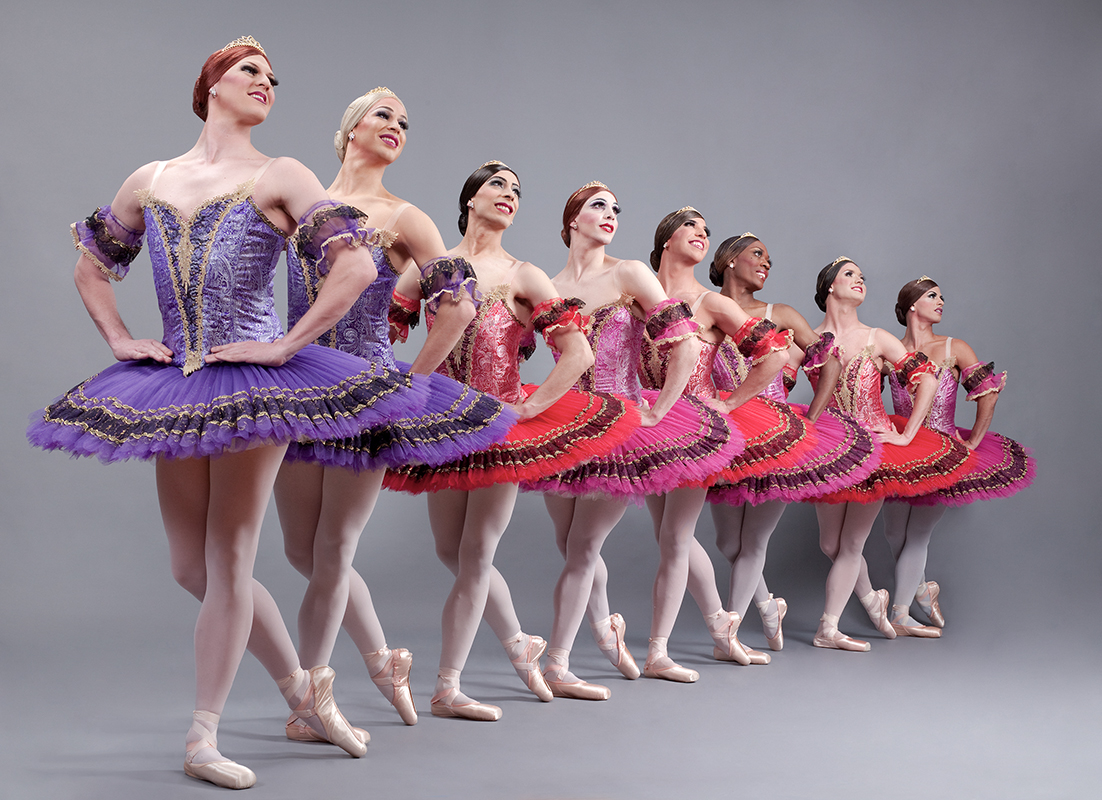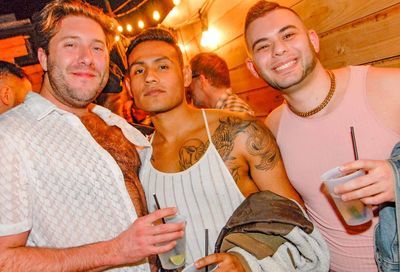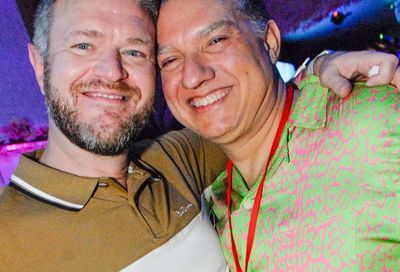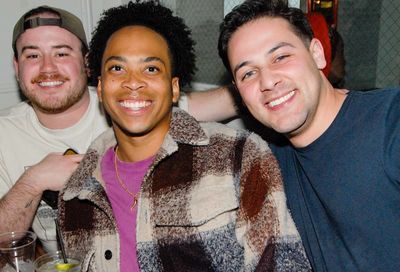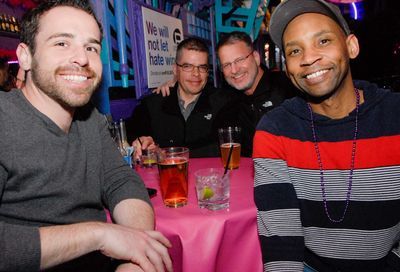Ari Shapiro: The Singing Reporter
NPR's Ari Shapiro has found the perfect side-career as a singer with the stylish lounge group Pink Martini

“Wait. Right now?”
It’s not every day you get to break news to a journalist. But a few minutes into a phone interview last Friday Ari Shapiro was informed that the Supreme Court had just issued its ruling on marriage equality. A quick check of the website of Shapiro’s employer confirmed it. “Supreme Court Declares Same-Sex Marriage Legal in All 50 States,” National Public Radio reported at 10:05 a.m.
“Wow,” Shapiro says. “Wow, wow, wow! This is amazing!”
Shapiro got his start as an intern for NPR’s venerable Nina Totenberg, but since the beginning of last year he has been reporting for NPR from London, covering a wide range of topics — news, culture, business trends from around the U.K. and Europe, “really whatever is happening that is interesting to me or that might be interesting to NPR listeners.”
The downside is it requires a long-distance relationship. His husband, Mike Gottlieb, remains in D.C., a lawyer for the White House. “We see each other about once a month,” Shapiro says. “Because I travel so much, if he were in London, I would still see him rarely. And this way we set aside time to see each other. It’s obviously not ideal, but it’s also not forever.”
In addition to his work for NPR, Shapiro has become known in recent years for his side work performing and recording with the quirky cocktail band Pink Martini, whom he’ll perform with next Friday, July 10, at Wolf Trap. Though he grew up singing in choirs and in musicals, his work with Pink Martini is not something he ever imagined would happen. Then again, few, Shapiro included, ever imagined the Supreme Court would make same-sex marriages legal in all 50 states.
“Listen, if the Supreme Court bumps me, I will understand,” Shapiro says, when told he might not in fact be on the cover of this week’s Metro Weekly, adding, with a laugh, “that’s a totally legitimate reason not to be on the cover.”
METRO WEEKLY: Before you became an International Correspondent reporting from London, you covered the White House and the Justice Department for NPR. Didn’t you also cover the Supreme Court?
ARI SHAPIRO: I got my start in journalism as an intern for Nina Totenberg, who covered the Supreme Court. And on very busy Supreme Court days when they needed all-hands-on-deck, I would be called in to help with court coverage. But that was never my beat per se. I covered the U.S. Department of Justice during the George W. Bush Administration and the start of the Obama Administration. So it was a lot of counter-terrorism stuff, surveillance, interrogation, the wars in Iraq and Afghanistan. And then I covered the White House and the 2012 presidential campaign.
MW: Do you wish you had been in D.C. to assist with the coverage of this year’s Supreme Court rulings, the marriage equality case in particular?
SHAPIRO: Do I wish I were there to help cover it? I tend not to have journalistic F.O.M.O. — Fear of Missing Out. In the course of my journalism career, there are so many terrific, engaging stories that wouldn’t capture the world’s attention but for the fact that I chose to tell those stories. As long as I am engaged and stimulated by the stories I’m covering, what’s the point of wishing you were covering something else?
MW: I just heard F.O.M.O. used for the first time from an Inside Amy Schumer skit. I guess that term has actually been around a while?
SHAPIRO: I’ve known F.O.M.O. for a while, for sure — certainly before I came to London. But I’m embarrassed to say that I know Amy Schumer is a huge comedy icon in the states right now, but now that I no longer live in the states, I could not quote one Amy Schumer line to you. I sound like a complete out-of-touch cultural fossil, but I have not watched a single Amy Schumer sketch. I’m out of the loop when it comes to a few really important key American cultural touchstones.
MW: But you’re in London, where a lot of shows, music and other culture ideas and trends are born before they make it over here.
SHAPIRO: Yes. So I’m ahead of the curve in certain ways, and way behind the curve in other ways.
MW: You were ahead of the curve by getting married 11 years ago in California.
SHAPIRO: We got married in 2004, when same-sex marriage was an extraordinarily new thing. It was when San Francisco Mayor Gavin Newsom started doing same-sex marriages. Mike, my husband, grew up in San Francisco, so this was his hometown. My goal was not to make a political statement. Unfortunately I had no choice but to get married in a way that happens to make a political statement.
In the 10 years since, I’ve done stories about same-sex marriage. Evaluated on their merits, they are thoughtful and fair and comprehensive and in some ways richer, coming from a person who knows the subject personally. I don’t think my stories sound like the biased tirade of a partisan. But as a journalist I tend to try to avoid making political statements.
We had another ceremony in 2005, because the wedding in California was such short notice — three days’ notice — it was literally my parents and his parents in City Hall. Plus my brother flew in from Seattle. So the following summer we had a wedding with all our friends and family. His family rabbi and my family rabbi co-officiated. My family rabbi came from the Conservative movement of Judaism, which at the time did not endorse same-sex marriage. But this was important to him — it was the first same-sex marriage that either rabbi had performed. They were very clear that they were doing this not as a favor to us, but because it was something that we had every right to expect from our community.
MW: What do you think the next steps are for LGBT rights in general?
SHAPIRO: To be honest, I’m a little bit reluctant to answer that question, not having taken a step back to think about and read the ruling. I don’t want to right now to, off the top of my head, say something that in a week’s time will seem off-base or obvious. Even an hour from now, having actually had a chance to think about it, I will possibly have more insight than I will have at this moment.
MW: Do you have a legal background, or is that something you learned on the job?
SHAPIRO: I majored in English in college. I have no legal training whatsoever. That’s one of the things I love about journalism. You get to learn about something new every day. I spent four years learning about legal issues when I covered the Justice beat. And I learned a lot about politics when I covered the White House and the presidential campaign. And this beat that I’m in now allows me to learn about different cultures and places. The key trait that makes journalism a perfect career for me is curiosity. Having this job where I’m not just using information that I acquired when I was in school, but rather acquiring new information everyday, fits my personality well.
MW: Were you raised to be curious?
SHAPIRO: I think so. My parents were both college professors. My parents would always say, the more you learn, the more interesting the world is. As a kid, they would take me and my brothers hiking. I was interested in bird watching. And my older brother was interested in geology. And my father collected wild mushrooms. And my mother knew wildflowers. And so, as we would go hiking, being able to recognize a bird call, or identify a wildflower, or describe the geology in the cliff base. It made the world a more interesting place, as my parents said. I still find that to be true today.
MW: Was coming out easy, or was it painful, or somewhere in between?
SHAPIRO: I think it is very rarely easy. Relative to many people I know, I would not describe it as painful, but I would describe it as challenging. I came out the summer after my junior year of high school. If you had to be a gay teenager anywhere in America in the ’90s, Portland, Oregon, was a pretty good place to do it. There were queer youth groups, there was an underage gay nightclub. I expected to come out and be totally alone — nobody was out at my public high school. But after I came out, I discovered there was this whole community in Portland. And it was a community that ranged from wealthy private school children to homeless drug-using youth on the street. And we all kind of looked out for each other in this pretty remarkable way. And I don’t know how many other cities in America had that in the mid-1990s.
MW: High school is a pretty young age to come out. Did you not struggle with it for years, particularly on religious grounds?
SHAPIRO: No. For me, religion was never an obstacle to being gay. My family was very active in the Jewish community, and there was absolutely no homophobia. But there were also no clear role models. I think most people coming out in that era, at that age, like me, had the impression that being gay meant you had to fall into a particular niche, or fit a very narrow cliche or stereotype. I have great respect for florists and hairdressers, but I had no desire to be a florist or a hairdresser. Those were the only examples I had of what it meant to be gay. There was never a sense of, I’m a sinner, or I’ll be condemned to hell. That wasn’t a factor. It was just a factor of, “Well, I guess my life will have to be less than I had hoped it could be.”
I wrote an essay for the Yale alumni magazine some years ago. They asked somebody from each of the last five decades to write an essay about being gay at Yale. And the thrust of my essay was that, I had this very banal experience. Basically I went to college, met the guy who I ended up marrying — which people have been doing for generations. And the banality of my experience was only possible because of generations of people earlier, who were not able to have a banal experience. They were forced to fight or hide.
MW: Your family is obviously supportive of your marriage and of Mike.
SHAPIRO: Completely, yeah, yeah. I think our mothers probably talk to each other more than either of us talks to our mothers. [Laughs.] Mike’s mother is in San Francisco, my mother is in Portland. They’re both these sort of West Coast Jewish mothers who see the world through a similar lens.
MW: Do you think you’ll move to the West Coast at some point?
SHAPIRO: I feel more at home in Portland than I do anywhere else. When I show up in the city, it’s like, oh yeah, those are my people. Even though I don’t have the piercings and the facial hair and the tattoos, on the inside I connect with those people. But I just think professionally there are opportunities for me that just don’t exist on the West Coast.
MW: How do you feel about Portlandia?
SHAPIRO: Before the show debuted, Morning Edition asked if I would do a review of the show as a local. And I thought well, that’s kind of boring. Let’s do something a little more interesting. I was going to be back in Portland anyway visiting my family. And I got in touch with Portlandia‘s co-creator Carrie Brownstein, and we came up with this plan to do a segment for Morning Edition, where we would basically walk around Portland trying to find places that were so quintessentially, stereotypically Portland they could just translate directly to the show without any parody, without any change. It was so easy! It was like shooting fish in a barrel. Portland really is like that. As my husband says, people in Portland reflect their city more than any people in any other city in the world. That is to say, Parisians are not as Parisian as Portlanders are Portland.
MW: Pink Martini is a Portland band. You’ve been involved with them for about six years?
SHAPIRO: I recorded with them for the first time in either 2008 or 2009. Let’s see, I can actually Google this.
MW: How often do you Google yourself?
SHAPIRO: Only when there’s something specific that I need to know that I don’t remember. Which is more often than it should be, given that I’m not yet at the age when I should be forgetting things. [Laughs.] Okay, so my first performance was 2009.
MW: And that developed because of your ties to Portland?
SHAPIRO: Well, it’s a long story. I mean, there are lots of people from Portland who have not performed with Pink Martini. [Laughs.] It is a semi-large city. But I was a fan of theirs when I was a kid. They started 20 years ago, in the mid-nineties. And when I was in high school I would go to their little shows in bars and clubs, and they were sort of a favorite Portland band that no one had heard of. And this was before the Portland music scene had really exploded in the way that today everybody thinks Portland is a really great music city. That wasn’t really the case 20 years ago.
Pink Martini was one of the favorite hometown bands. And they had this great style — they’re glamorous. And I loved their music, and I would go to their shows. When I was in college, their first CD came out, and I remembered bringing it back to college and playing it for all of my friends. It was my dinner party soundtrack from when I was throwing my first-ever dinner party.
After college I became friends with them. And so when they would come to D.C., I would throw them a party. And in 2008, I threw a party for them that happened to be the night that the Portland band Blind Pilot was also in town. So it was a barbeque in our backyard. It was all my D.C. friends and Blind Pilot and Pink Martini. And it kind of went all night, and then it turned into this sing-along around my piano. And Thomas Lauderdale, Pink Martini’s band leader, was at the piano, and everybody was all singing together. And it went until about probably 2 in the morning. It was a Monday night. And the band was performing Tuesday night at Wolf Trap, and Thomas called me that morning: “We have this concept for a song on the next album that we want a man to sing. Why don’t you come sing it?” I said sure. That night at Wolf Trap, he brought me backstage. He pulled out like a sheet of paper with scrawled lyrics, and we sat at his piano, and he played for me the rough structure of what turned into the song “But Now I’m Back.”
MW: Since then you’ve performed all over the world with them.
SHAPIRO: Yeah. Which was really scary. In America, I could ride on the fact that people knew NPR. Some of them knew who I was. I was a journalist, not a singer, so I could get away with it. But the first time we went overseas, we were performing for an audience where nobody had heard of NPR. They certainly had not heard of me. And so suddenly, I had to fall on my merits as a performer, not just as a sort of gimmicky special guest.
MW: What will you be performing at Wolf Trap next week?
SHAPIRO: I don’t know the exact set list. Thomas tends to write the set list 30 minutes before the show, give or take. So you have to show up prepared for anything.
I do know that we’re working on a new song, which is actually a very old school in Armenian.
MW: You don’t speak Armenian, do you?
SHAPIRO: I don’t speak Armenian. But I also don’t speak Hindi or Greek or Spanish or any of the other languages that I sing with the band. So the other night I actually called a good friend of mine in San Francisco, who is Armenian. And we spent about an hour on the phone. He walked me through the pronunciation of all these words, and the meaning of all the words. It’s important to me when I’m singing, even I don’t speak the language, that I know the meaning of the words that I’m singing. And also it’s important to me that I learn the pronunciation from a native speaker, or at least somebody who is fluent in the language.
MW: How often do you perform with Pink Martini these days?
SHAPIRO: It varies. This is one of the longest stretches I’ve gone without performing with them. It’s been since a show in L.A. on New Year’s Eve. But I’m doing a couple of shows with them on this tour, and then in early September I’m joining them for another week of performances, including the Hollywood Bowl.
I think after six years and three albums, it seems like this is actually real. You know, like this is not just this random one-off thing. This is actually now kind of a part of my life, and I’m really happy that it is. Pink Martini is a band that I have admired and loved and listened to for the last 20 years. And they perform in the greatest venues in the world. So I do feel a little spoiled.
Ari Shapiro performs with Pink Martini on Friday, July 10, at 8 p.m., at The Filene Center at Wolf Trap, 1551 Trap Road, Vienna. Tickets are $28 to $50. Call 877-WOLFTRAP or visit wolftrap.org.
Support Metro Weekly’s Journalism
These are challenging times for news organizations. And yet it’s crucial we stay active and provide vital resources and information to both our local readers and the world. So won’t you please take a moment and consider supporting Metro Weekly with a membership? For as little as $5 a month, you can help ensure Metro Weekly magazine and MetroWeekly.com remain free, viable resources as we provide the best, most diverse, culturally-resonant LGBTQ coverage in both the D.C. region and around the world. Memberships come with exclusive perks and discounts, your own personal digital delivery of each week’s magazine (and an archive), access to our Member's Lounge when it launches this fall, and exclusive members-only items like Metro Weekly Membership Mugs and Tote Bags! Check out all our membership levels here and please join us today!






